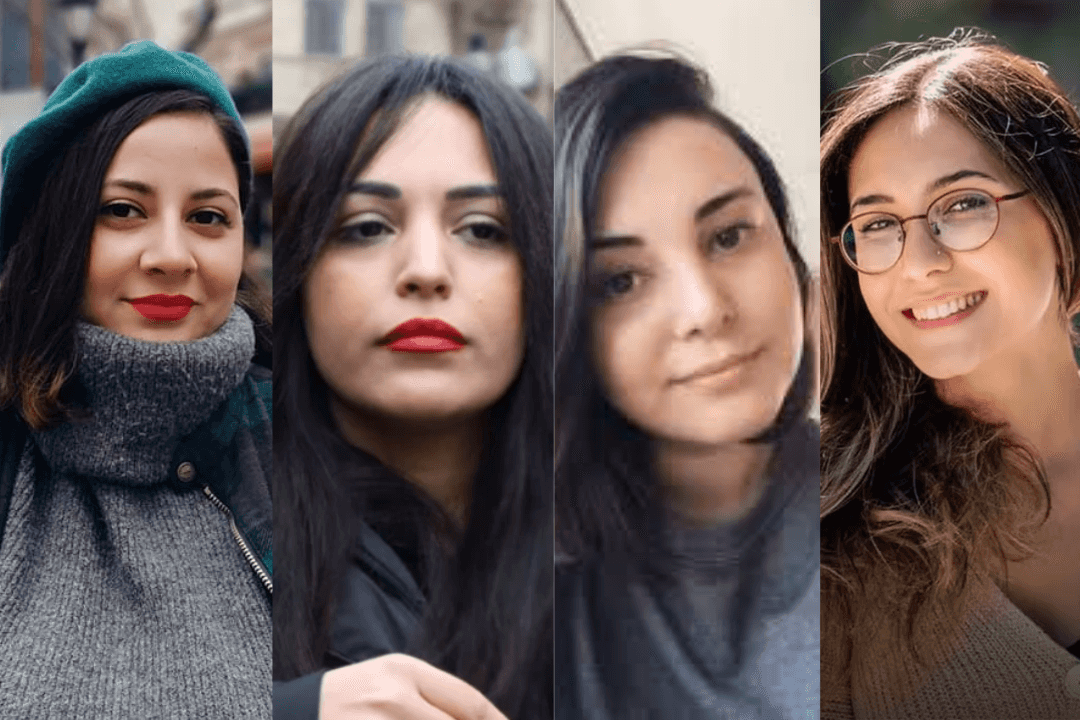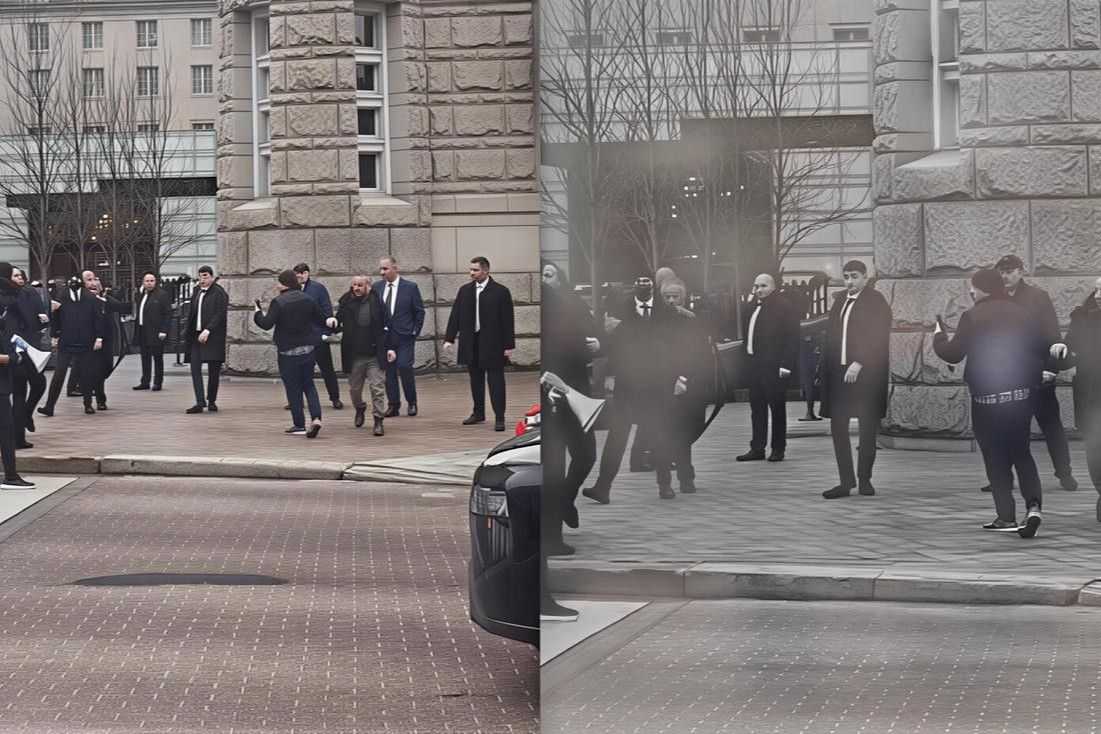
Broadcasting in Armenian across Nagorno-Karabakh, the Baku-based CBC FM hopes to reach out to the region’s Armenian population in order to ‘integrate’ them into Azerbaijani society. But with its frequent parroting of the Azerbaijani government line, the station’s mission remains questionable.
‘I don’t call them enemies, we are neighbours and must live in peace’, says 59-year-old Gulnara Javadova, who is translating into Armenian a text about the current socio-political situation there after the Second Nagorno-Karabakh War.
Javadova, a self-declared fighter on the information front, is fluent in Armenian because she lived in the Armenian city of Stepanavan for 12 years as a child. Together with seven other Armenian-speaking journalists, she works for the Baku-based CBC FM — a radio station launched by the Caspian International Broadcasting Company on 8 May 2021. The station broadcasts throughout Nagorno-Karabakh.
In an interview dedicated to the inauguration of the radio station, CBC’s CEO, Vugar Khalilov, said they hoped to ‘win the trust of listeners through news programmes, cultural and educational programmes’.
CBC TV has been broadcasting round the clock across Eurasia, from the Balkan peninsula to China since 2013. With a main target audience of viewers from former Soviet-bloc countries, as well as the European Union, the TV channel’s stated goal is to promote the successes of Azerbaijan in the political, economic, social, cultural, and sports domains, in Azerbaijani, Armenian, Russian, and English.
CBC FM’s goals, though, are rather more local, says Sohbet Mammadov, the editor of the Armenian-language news department. He says their main aim is the integration of the Armenians remaining in Nagorno-Karabakh into Azerbaijani society following the Second Nagorno-Karabakh War.
CBC FM broadcasts news programmes, analytical materials, and programmes about the culture and history of Nagorno-Karabakh in Azerbaijani, Russian and Armenian. The channel also plays music, including in Armenian.
Sohbet Mammadov is one of the Armenian-language news presenters. He was born in the Armenian capital of Yerevan. A teacher by profession, his student days and the first years of his career took place in the quiet years before the ethnic strife of the late 1980s, which would eventually spill over into full-scale war between Armenia and Azerbaijan over the fate of Nagorno-Karabakh.
He remembers his Armenian neighbours, who hid him and his family from nationalists who were breaking into the apartments of Azerbaijanis. The family delayed their departure from Armenia to the last as they wanted to remove the grave of Sohbet’s brother to Azerbaijan. When this turned out to be impossible, Mamadov’s family left for Baku in January 1990.
‘When we achieve peace, we [CBC] will talk about, say, how an Armenian called Aram and an Azerbaijani called Vagif have built something together. Or Vahid from Azerbaijan has married Anahit from Armenia, they have founded a mixed family. Or a joint cultural event can be held and we could report it’, he says.
Despite these lofty goals, currently, CBC FM relays mostly the official reactions of the Azerbaijani government and military to statements of their Armenian counterparts. Afterwards, the news department prepares programmes about these statements. Moreover, the station airs interviews by both Azerbaijani experts, and pro-Azerbaijani experts from Russia, Ukraine, Turkey, and Georgia, translating them into Armenian.
Is anyone listening?
Despite CBC TV boasting more than 37 million views and almost 32,000 new subscribers in 2021 alone, the radio station has struggled to replicate this success. CBC FM has few followers on social media, raising the question if there is any interest among the Armenian population of Nagorno-Karabakh.
Since the war, Gagik (not his real name), a 67-year-old retiree from Hadrut, has lived as a refugee in Yerevan. After noticing his neighbours watching Azerbaijani TV channels, he says he asked them to tune his TV set in too.
‘I was curious what was happening there with the people who once lived next to us’, Gagik says. ‘Sometimes they showed refugees, and I was looking for our neighbours.’
Robert (not real name), 22, is another refugee from Hadrut displaced in the latest fighting. He is studying to be an actor in Yerevan. Robert recalls managing to tune in to Azerbaijani state-run TV before the 2020 war.
‘We were interested in what they were saying about Armenia and Artsakh [Nagorno-Karabakh]. What solutions do they see? And before the war there was a feeling that the war would start, they were very aggressive and talked a lot about the return of the land’, Robert says.
Others, like Suzanna, a 32-year-old history teacher living in Stepanakert (Khankendi), Nagorno-Karabakh, have little interest in hearing from Azerbaijani media outlets.
Suzanna says Azerbaijani channels conceal the real state of affairs in Azerbaijan, and do not show any of the problems there.
‘I don’t follow their media in Armenian because there is a lot of propaganda’, she adds.
Doomed to fail?
CBC FM is not the first radio station in the South Caucasus to attempt to bridge a conflict divide.
In 2005, Alania TV, later Region TV, was set up with the aid of the Georgian authorities to broadcast in Russian in South Ossetia.
Born in Sukhumi (Sukhum), Abkhazia, Ia Barateli previously worked in now-defunct Region TV’s news department.
‘It was important to show the positive changes taking place in Georgia, such as the construction of highways, renovation of cities like Batumi or Sighnaghi, because no Russian TV channel would cover this’, she says.
‘We didn’t create news out of nothing. It was a well-thought-out government policy aimed at integration. Propaganda is good in the only case — when it comes to real measures and steps aimed at the benefit of society’, says Barateli.
But while experts say the former Soviet Union has a long history of ‘positive propaganda’, many are less convinced about its effectiveness.
According to Laurence Broers, the Caucasus programme director at London-based peacebuilding organisation Conciliation Resources, distrust of official narratives is a core legacy of the communist experience, one which is still very strong everywhere in the South Caucasus.
According to him, no matter if propaganda is positive or not, it is doomed to fail in persuading its target audience.
‘ “Positive propaganda” might be of interest to its target community as a way of gaining insights into what the real understandings, priorities, and resources are on the side producing that propaganda’, he says, echoing the motivations of Gagik and Robert from Hadrut.
‘But isolated from a wider strategy that provides for engagement with the target community’s own needs and priorities, it will continue to be perceived within an adversarial framework.’
Broers also says he believes that in a context where independent media activity is very restricted, propaganda will be seen as just another element of state policy.
On the contrary, he says that better strategic communication from the government — effectively communicating state policies towards the conflict regions — could prove more popular and effective.
Indeed, Gulnara Javadova admits the editorial board so far has had neither direct feedback from Armenians in Nagorno-Karabakh nor any local sources willing to share their programming.
‘Reactions there are different. But a lot will depend on how they feel about us’, she concludes.








